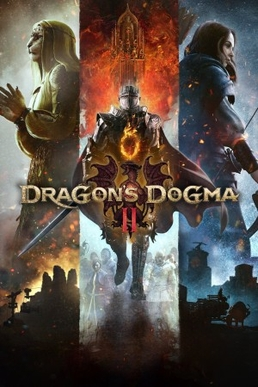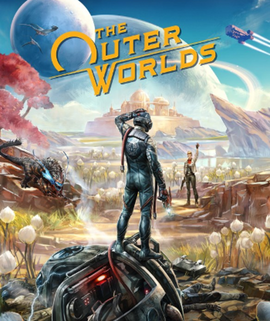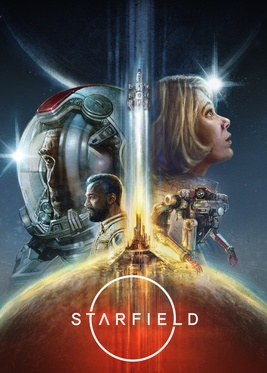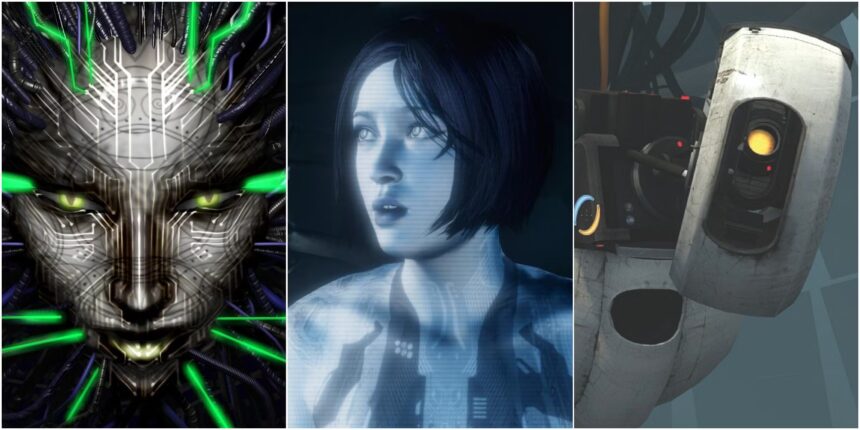In this article, I will discuss the Best Games With AI Companions That Feel Real, focusing on the ways where allies transcend the boundaries of the pre-defined actions and provide emotional depth, intelligent assistance, and world-building interactions.
Through advanced AI, these companions deepen the narrative, respond to the player’s actions, and interact dynamically within the game, forging moments that transcend the boundaries of programming and personality.
Key Point & Best Games With AI Companions That Feel Real List
| Game Title | Key Point Summary |
|---|---|
| Dragon’s Dogma 2 | Expansive open-world RPG with dynamic combat and a unique pawn companion system. |
| Sons of the Forest | Survival horror sequel with deep crafting, AI companions, and immersive base building. |
| Bioshock Infinite | Story-driven FPS set in a floating city, with rich themes and dimensional travel. |
| The Last of Us Part II | Emotional narrative, intense stealth-action gameplay, and deep character development. |
| Mass Effect Series | Sci-fi RPG epic known for player-driven choices, deep lore, and interstellar combat. |
| The Outer Worlds | Satirical space RPG with branching dialogue, factions, and moral player choices. |
| Beyond Good & Evil | Cult classic adventure blending stealth, puzzles, and photojournalism mechanics. |
| Starfield | Bethesda’s massive space exploration RPG with shipbuilding and interplanetary travel. |
| Firewatch | Narrative-driven walking sim with emotional storytelling and stunning visual design. |
| Halo Infinite | Revives Halo’s core mechanics with open-world elements and refined multiplayer. |
1.Dragon’s Dogma 2
Dragon’s Dogma 2 is one of the few games featuring AI companions to employ the innovative Pawn system which literally makes them feel real. Unlike monotonous NPC followers, the game’s Pawns help the Player and even learn to adapt to the Player’s gameplay style.

As primary roles can hardly be called tasks, they remember lore and give comments about the place and even display different manners. This makes the interaction feel casual, as interactions are not bound to the Player’s instructions.
The immersion and responsiveness, combined with the dynamically evolving understanding of the game world, is what makes the experience with Pawns so different and real compared to other AI companions.
Pros & Cons Dragon’s Dogma 2
Pros:
- Pawn System: AI companions are more personalized and can learn through the player’s actions.
- Combat Support: AI actively reinforces their role in class-specific battles.
- Exploration Feedback: Offers help with quests and locations.
Cons:
- Repetitive Dialogue: AI lines become stale and monotonous over time.
- Limited Emotional Depth: Lacks nuance when it comes to feelings and emotions.
- Online Dependency: Best AI features need online pawn sharing.
2.Sons of the Forest
Kelvin, the AI companion in Sons of the Forest, enhances the gameplay experience by augmenting gesture-based control with intuitive and thoughtful responsive behavior, marking a significant evolution in AI companions in video games.

Unlike the majority of AI companions in video games, Kelvin displays instinctive intelligence—safeguarding and even gathering resources, constructing shelters, and responding to threats autonomously.
Unlike machines, Kelvin’s subtle animations and exhaustion display make him appear human. As survivors of the uncanny wilderness, Kelvin’s instinctive and intentional actions foster a semblance of camaraderie in chilling isolation, and in stark contrast to stereotypical AI followers, his actions also determine the group’s survival, which deepens the bond.
Pros & Cons Sons of the Forest
Pros:
- Kelvin Companion: Follows commands without verbal input.
- Unique Behavior: AI can feign injury, act scared, or curious.
- Useful in Survival: Assists with resource and structure gathering.
Cons:
- Limited Commands: Scope of tasks is too basic.
- Buggy Behavior: AI has moments of poor performance.
- No Deep Bonding: Absence of an emotional bond or narrative layer.
3.Bioshock Infinite
Bioshock Infinite earns its place among the best games with AI companions that feel real because of the Elizabeth’s character arc as a companion who emotionally engages the player and helps mechanistically. Unlike most accompanying characters, Elizabeth does not require protection—she helps the player by Aid the player to gather supplies, opening rifts, and revealing secrets.

Her expression, awareness of the environment, and dialogues give rise to a bond that is real. She also “walks” with intent, “looks” around with purpose, and gives context aware reactions. Elizabeth is a character that AI has no hope of simulating at the moment.
Elizabeth enhances the story and the gameplay all at once and that makes her a great character. Primary expectation from a character of her nature is to break the illusion of Fiction. She has set new standards for game AI.
Pros & Cons BioShock Infinite
Pros:
- Elizabeth’s Intelligence: Actively aids in combat and exploration.
- Resource Help: Distributes ammo, money, and health in useful ways.
- Emotional Connection: Strong narrative connection with the main character.
Cons:
- Non-Combatant Role: Supports the player without engaging in fights.
- Linear Actions: Limited engagement depth beyond the primary narrative.
- Schedule Interactions: Does not vary interaction based on other events.
4.The Last of Us Part II
The Last of Us Part II portrays companions with remarkable realistic AI, with dynamic actions and responses based on the player’s choices and the emotional context of the moment.

Stealth, combat, and exploration are not just actions performed by the AI teammates; they are join actions where Dina and Jesse make thoughtful, human-like decisions. They stand out because they respond fluidly to diverse environments, interact freely, and demonstrate sentiment through their words and actions.
They are more than automatons; they behave as true companions would, with responses to stress, risk, and intimacy that evoke genuine relationships. The deep AI integration that defines the characters makes them extremely immersive and believable.
Pros & Cons The Last of Us Part II
Pros:
- Emotional Complexity: Allies in the story deeply feel emotions.
- Combat Recognition: Allies help in battles with stealth and while taking cover.
- Seamless Transitions: Blend moments of the narrative and gameplay.
Cons:
- Foreseeable AI: Stealth elements can be a bit too relentless.
- Freedom Script Restraint: Many predefined actions lose improvisation.
- Pre-cooked Interaction: AI responds to a limited set of given prompts.
5.Mass Effect Series
The Mass Effect series is immensely popular among gamers due to their AI companions which practically come to life because of the synergy between the story, the player, and the AI’s dynamic interactions with the player. Each squad member has a rich backstory, unique motivations, and evolving relationships shaped by your choices across the trilogy.

A crucial element in feeling genuine is the character interactions in each mission. Their personalities dictate how they engage in dialogue, mission execution, and their espousal of loyalty.
They argue, bond, and react to moral decisions, making them feel like genuine teammates rather than simple support units. The emotional connections formed—whether through camaraderie, conflict, or romance—make it more appealing that these companions exist beyond and combat, deepening the immersion.
Pros & Cons Mass Effect Series
Pros:
- Role Assigned: AI foes can be given specific roles and can be assigned to different classes.
- Bond Depth: Emotional relationships with other characters can be built with selectable conversations.
- Intelligent Interaction: Order interaction by issuing commands to the squad.
Cons:
- Movement Obstruction: Allies sometimes do not know how to reach a given space.
- Combat Dialogue: Expressions and phrases get reused too often.
- Fidelity: Players can make unwise decisions that hinder character development.
6.The Outer Worlds
The Outer Worlds introduced several well-developed AI companions owing to their unique character traits and their contributions to the story and gameplay. Each of them, including Parvati and Felix, has unique side quests, moral principles, and reacts to the player’s choices in an adaptive manner.

What makes them distinct is the way they interrupt dialogues, provide combat assistance, and demonstrate believable emotions in response to your actions. They do not simply comply with your orders; they provide commentary, offer dissent, and undergo progress alongside you.
The combination of narrative layering and interaction makes them not just companions you physically travel with, but characters who provide support and color your journey through Halcyon with emotional depth.
Pros & Cons The Outer Worlds
Pros:
- Combat Skills: Each AI character has distinctive advantages and combat skills.
- Moral Consideration: AIs make comments about actions the player takes.
- Companion Backstories: Extensive side quests linked to each character.
Cons:
- Emotionless Ties: Emotional development is restricted.
- Non-Responsiveness AI: Units unresponsiveness in battles.
- Static Interactions: No change over time in reactions.
7.Beyond Good & Evil
Beyond Good & Evil has earned its fame among games with AI attendants with realistic involvement through teamwork and emotional connections. Characters such as Pey’j do not simply stay behind—they help with puzzles, battles, and even walk with you as you explore in a purposeful manner.

What sets characters like Pey’j apart from most is the emotional depth that comes along with them and the consistent presence they have throughout the storyline, forming a bond that is personal.
Each dialogue, reaction, and helpful deed displays a relationship that has been built over time, not scripted lines. This form of collaboration, where your partner is both dependable and extraordinarily alive, is what grounds the experience and makes it feel emotionally charged.
Pros & Cons Beyond Good & Evil
Pros:
- Functional Partner: Assists in fighting and in solving puzzles.
- Light Humor: Provides comic relief and enhances the charm.
- Supportive Mechanics: Assists with creative navigation.
Cons:
- Outdated AI: Companion AI feels dated by modern standards.
- Limited Autonomy: Most actions need to be initiated by the player.
- Minimal Growth: Does not change throughout the game.
8.Starfield
Starfield exhibits vivid AI companions brought forth by the intricacies of relationships and interactivity. Companions such as Barrett and Sarah Morgan do not passively leave; they dissent and offer sulky compliance and reasoning as to of your ethical milestones. What separates them is the ability to remember things for a long time and the ability to show a range of emotions; they recall your past decisions or grow closer with your actions.

They offer help during battles, help manage the ship, and participate in multi-turn dialogues with changing topics. Because of the constant participation and change in interactions, the vast behavior of the companions is set to a very distinct person. This makes the vast, boundless space exploration more intimate and less mechanical.
Pros & Cons Starfield
Pros:
- Diverse Crew AI: Each crew member has distinct skills and an associated storyline.
- Romance & Dialogue: Relationships evolve in real-time.
- Tactical Support: Provides combat and ship role support.
Cons:
- Robotic Voice Acting: Some AI lines lack life.
- Repetitive Interactions: Lines are frequently repeated.
- Weak Emotional Arc: Relationships lack the depth of emotional resolution.
9.Firewatch
Firewatch provides a remarkably emotionally authentic AI companion experience due to the character of Delilah, who only speaks to you through a radio. Delilah’s character becomes “real” through her humorous and vulnerable dialogues that respond to player choices. Her voice, while never physically present, offers a steady emotional tether and dynamically reacts to the player’s discoveries and decisions.

The player’s tone and actions shape the dialogue, creating the feel of unscripted, real-time interaction. The design of Delilah as a character who only “exists” through voice and yet forms a human connection lends immersion and a rare, subtle, and profound resonance.
Pros & Cons Firewatch
Pros:
- Voice-Only Bond: Delilah is brought to life by her radio chats.
- Emotional Realism: Conversations change with the players decisions.
- Loneliness Offset: Companion eases the feeling of isolation.
Cons:
- No Physical Presence: Only a voice, never appears physically.
- Dialogue-Driven: No gameplay support, only narrative.
- Limited Impact: Players have little influence on the story.
10.Halo Infinite
Halo Infinite stands out with its hyper-realistic AI companions, particularly with “The Weapon”, an AI that develops alongside Master Chief and has emotional depth. She demonstrates curiosity, humor, and even moments of doubt, showcasing an emotional evolution that aligns with the player.

Master Chief users are accustomed to sassy AI with no emotions, but “The Weapon” surpasses those expectations as she embodyes real and vulnerable growth. During battles, “The Weapon” greatly assists him by sharing crucial information concerning the environment, aiding both the battles and the overall “cutscenes” as well. She doesn’t just fill the role of an AI assistant; through personal connection and witty dialogue, she develops into a trusted partner instead of an aide.
Pros & Cons Halo Infinite
Pros:
- The Weapon (AI): Captures the wit and wisdom of Cortana.
- Narrative Weight: Companions amplify emotional investments.
- Combat Commentary: Provides relevant and immersive feedback.
Cons:
- Less Tactical Input: Doesn’t shape options available to the player.
- Comparisons to Cortana: New AI may be overshadowed by expectations.
Conclusion
In summary, the finest games with AI partners that mimic human behavior move beyond rote functions and mere automation: they craft emotionally resonant, dynamic characters that respond to your decisions, actions, and surroundings.
From the tactical Pawns in Dragon’s Dogma 2 and the human Kelvin’s realistic frailty in Sons of the Forest to Delilah’s tender voice in Firewatch, each of the companions adds depth to the immersion. These games demonstrate that sophisticated AI can create authentic emotional bonds, transforming artificial support into reliable partners who enhance the story and the play experience in sophisticated, human ways.
FAQ
What makes an AI companion feel “real” in a video game?
Real-feeling AI companions display adaptive behavior, emotional depth, contextual responses, and meaningful interaction. They react to player decisions, engage in the story, and behave like autonomous individuals rather than scripted followers.
Are these AI companions helpful in gameplay or just story-driven?
The best AI companions enhance both. Games like The Outer Worlds and Mass Effect offer strategic combat assistance, while titles like Firewatch focus on emotional storytelling through realistic dialogue and bonding.









